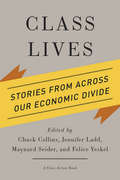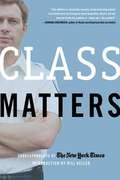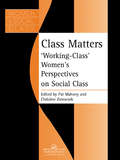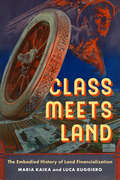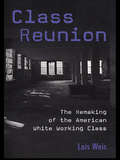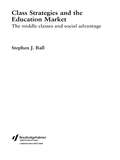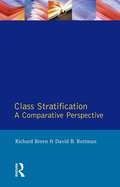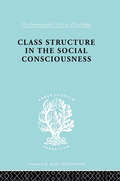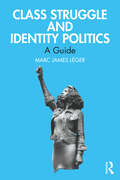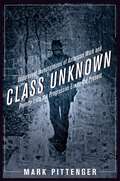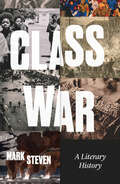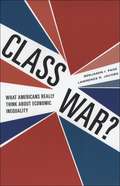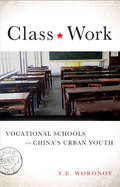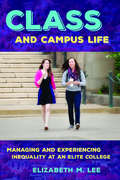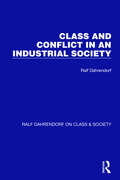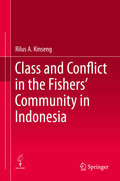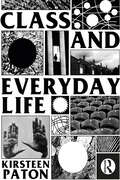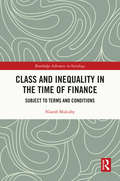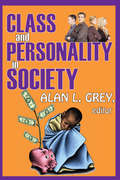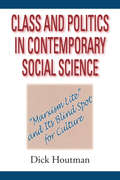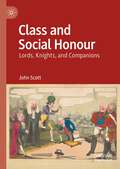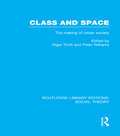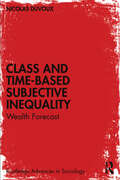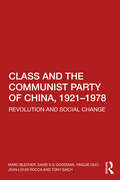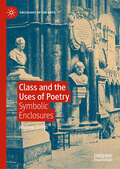- Table View
- List View
Class Lives: Stories from across Our Economic Divide
by Chuck Collins Felice Yeskel Jennifer Ladd Maynard SeiderClass Lives is an anthology of narratives dramatizing the lived experience of class in America. It includes forty original essays from authors who represent a range of classes, genders, races, ethnicities, ages, and occupations across the United States. Born into poverty, working class, the middle class, and the owning class--and every place in between--the contributors describe their class journeys in narrative form, recounting one or two key stories that illustrate their growing awareness of class and their place, changing or stable, within the class system. The stories in Class Lives are both gripping and moving. One contributor grows up in hunger and as an adult becomes an advocate for the poor and homeless. Another acknowledges the truth that her working-class father's achievements afforded her and the rest of the family access to people with power. A gifted child from a working-class home soon understands that intelligence is a commodity but finds his background incompatible with his aspirations and so attempts to divide his life into separate worlds. Together, these essays form a powerful narrative about the experience of class and the importance of learning about classism, class cultures, and the intersections of class, race, and gender. Class Lives will be a helpful resource for students, teachers, sociologists, diversity trainers, activists, and a general audience. It will leave readers with an appreciation of the poignancy and power of class and the journeys that Americans grapple with on a daily basis.
Class Matters
by Bill KellerThe acclaimed New York Times series on social class in America and its implications for the way we live our lives. "We Americans have long thought of ourselves as unburdened by class distinctions. We have no hereditary aristocracy or landed gentry, and even the poorest among us feel that they can become rich through education, hard work, or sheer gumption. And yet social class remains a powerful force in American life. In Class Matters, a team of New York Times reporters explores the ways in which class--defined as a combination of income, education, wealth, and occupation--influences destiny in a society that likes to think of itself as a land of opportunity. We meet individuals in Kentucky and Chicago who have used education to lift themselves out of poverty and others in Virginia and Washington whose lack of education holds them back. We meet an upper-middle-class family in Georgia who moves to a different town every few years, and the newly rich in Nantucket whose mega-mansions have driven out the longstanding residents. And we see how class disparities manifest themselves at the doctor's office and at the marriage altar. For anyone concerned about the future of the American dream, Class Matters is truly essential reading. Class Matters is a beautifully reported, deeply disturbing portrait of a society bent out of shape by harsh inequalities. Read it and see how you fit into the problem or--better yet--the solution!'-Barbara Ehrenreich, author of Nickel and Dimed and Bait and Switch
Class Matters: "Working Class" Women's Perspectives On Social Class (Women And Class Mini Ser.)
by Pat Mahony Christine Zmroczek Christine ZmroczekPat MahonyFirst published in 1997. Routledge is an imprint of Taylor & Francis, an informa company.
Class Meets Land: The Embodied History of Land Financialization (IJURR Studies in Urban and Social Change)
by Dr. Maria Kaika Luca RuggieroClass Meets Land reveals something seemingly counterintuitive: that nineteenth-century class struggles over land are deeply implicated in the transition to twenty-first-century financial capitalism. Challenging our understanding of land financialization as a recent phenomenon propelled by high finance, Maria Kaika and Luca Ruggiero foreground 150 years of class struggle over land as a catalyst for assembling the global financial constellation. Narrating the close-knit histories of industrial land, industrial elites, and the working class, the authors offer a novel understanding of land financialization as a "lived" process: the outcome of a relentless, socially embodied historical unfolding, in which shifts in land’s material, economic, and symbolic roles impact both local everyday lives and global capital flows.
Class Reunion: The Remaking of the American White Working Class (Critical Social Thought)
by Lois WeisNoted scholar Lois Weis first visited the town of "Freeway" in her 1990 book, Working Class Without Work. In that book we met the students and teachers of Freeway's high school to understand how these working-class folks made sense of their lives. Now, fifteen years later, Weis has gone back to Freeway for Class Reunion. This time her focus is on the now grown-up students who are, for the most part, still working class and now struggling to survive the challenges of the global economy. Class Reunion is a rare and valuable longitudinal ethnographic study that provides powerful, provocative insight into how the lives of these men and women have changed over the last two decades--and what their prospects might be for the future.
Class Strategies and the Education Market: The Middle Classes and Social Advantage
by Stephen J. BallClass Strategies and the Education Market examines the ways in which the middle classes maintain and improve their social advantages in and through education.Drawing on an extensive series of interviews with parents and children, this book identifies key moments of decision making in the construction of the educational trajectories of middle class children. Stephen J. Ball organises his analysis around the key concepts of social closure, social capital, values and principles and risk, while bringing a broad range of up-to-date sociological theory to bear upon his subject. From this thorough analysis, valuable and thought-provoking insights emerge into the assiduous care and considerable effort and expenditure which goes into ensuring the educational success of the middle class childThe middle classes are a sociological enigma, presenting the social researcher with considerable analytic and theoretical difficulties. Class Strategies and the Education Market provides a set of working tools for class analysis and the examination of class practices. Above all, it offers new ways of thinking about class theory and the relationships between classes in late modern society.
Class Stratification: Comparative Perspectives
by Richard Breen David B. RottmanAn introductory account of the concept of class stratification, of contemporary approaches to the study of class, and of current debates about its role in the study of society. Definitions and an analysis of different theoretical approaches to class are accompanied by empirical material which compares the class structures of a range of countries and examines social mobility in cross-national perspective.
Class Struc Soc Conscn Ils 104 (International Library of Sociology)
by Stanislaw OssowskiFirst published in 1998. Routledge is an imprint of Taylor & Francis, an informa company.
Class Struggle and Identity Politics: A Guide
by Marc James LégerContemporary bipartisan politics undermines socialist solidarity by ignoring class issues and pitting advocates of social justice against ethno-national chauvinists. This guide to the recent wave of "woke" culture wars provides a radical class analysis and critique of the most popular academic trends around diversity and inclusion: radical democracy, intersectionality, privilege theory, critical race theory and decoloniality. The book further explains the complexity of today’s cultural conflicts by examining how these issues are viewed across the political spectrum, including populist and postmodern perspectives. Exploring historical, cultural, political and economic developments since the postwar era, this follow- up to Identity Trumps Socialism provides the reader with everything you wanted to know but were afraid to ask about the campus wars that have gone mainstream.
Class Unknown: Undercover Investigations of American Work and Poverty from the Progressive Era to the Present (Culture, Labor, History #4)
by Mark PittengerSince the Gilded Age, social scientists, middle-class reformers, and writers have left the comforts of their offices to "pass" as steel workers, coal miners, assembly-line laborers, waitresses, hoboes, and other working and poor people in an attempt to gain a fuller and more authentic understanding of the lives of the working class and the poor. In this first, sweeping study of undercover investigations of work and poverty in America, award-winning historian Mark Pittenger examines howintellectuals were shaped by their experiences with the poor, and how despite their sympathy toward working-class people, they unintentionally helped to develop the contemporary concept of a degraded and "other" American underclass.While contributing to our understanding of the history of American socialthought, Class Unknown offers a new perspective on contemporary debates over how we understandand represent our own society and its class divisions.
Class War: A Literary History
by Mark StevenA bold new history of the global class war A thrilling and vivid work of history, Class War weaves together literature and politics to chart the making and unmaking of social class through revolutionary combat. In a narrative that spans the globe and more than two centuries of history, Mark Steven traces the history of class war from the Haitian Revolution to Black Lives Matter. Surveying the literature of revolution, from the poetry of Shelley and Byron to the novels of Émile Zola and Jack London, exploring the writings of Frantz Fanon, Che Guevara, and Assata Shakur, Class War reveals the interplay between military action and the politics of class, showing how solidarity flourishes in times of conflict. Written with verve and ranging across diverse historical settings, Class War traverses industrial battles, guerrilla insurgencies, and anticolonial resistance, as well as large-scale combat operations waged against capitalism's regimes and its interstate system. In our age of economic crisis, ecological catastrophe, and planetary unrest, Steven tells the stories of those whose actions will help guide future militants toward a revolutionary horizon.
Class War? What Americans Really Think about Economic Inequality
by Benjamin I. Page Lawrence R. JacobsIn Class War the authors present compelling evidence that most Americans favor free enterprise and practical government programs to distribute wealth more equitably.
Class Work
by Terry WoronovImages of Chinese teens with their heads buried in books for hours on end, preparing for high-stakes exams, dominate understandings of Chinese youth in both China and the West. But what about young people who are not on the path to academic success? What happens to youth who fail the state's high-stakes exams? What many--even in China--don't realize is that up to half of the nation's youth are flunked out of the academic education system after 9th grade. Class Work explores the consequences for youth who have failed these exams, through an examination of two urban vocational schools in Nanjing, China. Through a close look at the students' backgrounds, experiences, the schools they attend, and their trajectories into the workforce, T.E. Woronov explores the value systems in contemporary China that stigmatize youth in urban vocational schools as "failures," and the political and economic structures that funnel them into working-class futures. She argues that these marginalized students and schools provide a privileged window into the ongoing, complex intersections between the socialist and capitalist modes of production in China today and the rapid transformation of China's cities into post-industrial, service-based economies. This book advances the notion that urban vocational schools are not merely "holding tanks" for academic failures; instead they are incipient sites for the formation of a new working class.
Class and Campus Life: Managing and Experiencing Inequality at an Elite College
by Elizabeth M. LeeIn 2015, the New York Times reported, "The bright children of janitors and nail salon workers, bus drivers and fast-food cooks may not have grown up with the edifying vacations, museum excursions, daily doses of NPR and prep schools that groom Ivy applicants, but they are coveted candidates for elite campuses." What happens to academically talented but economically challenged "first-gen" students when they arrive on campus? Class markers aren't always visible from a distance, but socioeconomic differences permeate campus life--and the inner experiences of students--in real and sometimes unexpected ways. In Class and Campus Life, Elizabeth M. Lee shows how class differences are enacted and negotiated by students, faculty, and administrators at an elite liberal arts college for women located in the Northeast. Using material from two years of fieldwork and more than 140 interviews with students, faculty, administrators, and alumnae at the pseudonymous Linden College, Lee adds depth to our understanding of inequality in higher education. An essential part of her analysis is to illuminate the ways in which the students' and the college's practices interact, rather than evaluating them separately, as seemingly unrelated spheres. She also analyzes underlying moral judgments brought to light through cultural connotations of merit, hard work by individuals, and making it on your own that permeate American higher education. Using students' own descriptions and understandings of their experiences to illustrate the complexity of these issues, Lee shows how the lived experience of socioeconomic difference is often defined in moral, as well as economic, terms, and that tensions, often unspoken, undermine students' senses of belonging.
Class and Conflict in an Industrial Society (Ralf Dahrendorf on Class & Society #1)
by Ralf DahrendorfOriginally published in England in 1959, this book evolves a new theory of conflict in industrial society. By way of illustrating and testing this theory, the book provides detailed analyses of various social phenomena. The author carries out a full critique of Marx in the light of history and modern sociology and discusses the theories of class-conflict of James Burnham, Fritz Croner and Karl Renner.
Class and Conflict in the Fishers' Community in Indonesia
by Rilus A. KinsengThis book analyses social conflict among fishers in Indonesia by implementing class theory, thus adopting a new approach to analysing fishers’ conflicts in Indonesia. In using this approach, the book enables a comprehensive understanding of the nature of fishers’ social conflicts. It demonstrates that the primary cause triggering conflict among fishers in Indonesia is not exploitation, but domination. This domination causes injustice in terms of access among fishers, which in turn threatens their livelihood. The author unpacks the influence of political parties, and how macro-economic conditions and public policy have become contextual variables of these class conflicts in the fisheries community. The book presents the unique characteristics of class conflicts among fishers compared to class conflicts in industrial sectors, underpinned by Marxist theory. This book will be relevant to fisheries policy-makers in Indonesia and abroad, researchers and students in anthropology, sociology, and development economics, as well as community and rural development specialists and conservationists.
Class and Everyday Life
by Kirsteen PatonExploring the issues of class through in-depth studies of housing, sport, art, music and politics in Britain, Class and Everyday Life persuasively demonstrates the pervasive influence of class on everyday life and the need to centre a radical understanding of class within emancipatory political movements. The need for a more expansive understanding of class is politically urgent. There is a disconnect between descriptive and analytical approaches to class and the politics of class and realities around how class is lived. Discourse has been shaped by top-down frameworks of analysis and measurements which have stripped the study of class of its political radicalism. This book makes the case for a sociology of class which is informed by a politics of class, based upon using the everyday as the point of enquiry. It presents a sociology of class from the bottom-up which focuses on everyday life and the point at which class is made and remade. In doing so, it advocates for an attentiveness to class and everyday life through a conjunctural analysis. Using an everyday lens, this book examines how the shifting conjunctures manifest in everyday spaces in classed ways and how such changes are negotiated, resisted and shape the working-class subject and communities. This is based upon an understanding of everyday classed experiences which identifies and challenges inequalities while also recognising value and hope. This perspective aims to offer a recognition of both the opportunities and challenges of class as a way of developing a stronger, more politicised understanding of class which takes solidarity and class community power seriously to resist inequality and develop emancipatory politics. This urgent and impassioned book will be essential reading for students, academics and activists with an interest in the lived experience of class in Britain today.
Class and Inequality in the Time of Finance: Subject to Terms and Conditions (Routledge Advances in Sociology)
by Niamh MulcahyThis book explores the effects of the gradual liberalisation of capital markets and the expansion of consumer credit on poorer households in the United Kingdom, with particular attention to the precariousness caused by a lack of savings and a reliance on debt. Asking what it means for poorer working individuals and households to be subject to the demands of finance, the author draws on Michel Foucault’s theory of subjectivation as well as Louis Althusser’s interest in class, actively theorising the constraints of low income or precarious work on financial planning, alongside the reorganisation or rollback of government benefits. A contribution to our understanding of the ways in which financial concerns deepen and expand economic inequality, Class and Inequality in the Time of Finance shows how finance stratifies individual subjects rather than simply individualising and separating them. As such, it will appeal to scholars of sociology with interests in neoliberalism, economic austerity, and consumer credit and debt.
Class and Personality in Society
by Alan L. GreyThis volume graphically demonstrates how differences in social class affect personality. It does so by presenting research in class character covering a broad range of phenomena in the area shared by psychology, sociology, psychiatry, and anthropology. Concerned with key issues of substance and method in this area, the essays in Class and Personality in Society provide firsthand experience in the divergent ways in which specialists view and explore the relationship between personality and social status. The material offers a picture of how, out of controversy and confusion, scholars and researchers can achieve order, clarity, and sophistication. The editor's extensive introductory essay provides frames of reference from the social sciences pertinent to this aspect of social psychology. It describes historic trends and suggests fresh answers to controversial issues such as the nature of American class structure, the contribution of psychoanalysis to psychological research, and the relative importance, to personality, of early training versus current circumstance. Calling for more sociological awareness in psychological research, Grey documents his views with specific examples. The discussion is further enlivened by its pertinence to such current problems as the culture of poverty and community psychiatry. Class and Personality in Society was originally intended for use in courses in Social Psychology and Culture and Personality, and in sociology courses that discuss how social institutions and processes are related to individual personality. It may also provide stimulating supplemental reading in introductory psychology or sociology course. It will also prove valuable to professionals in specialized programs in clinical psychology and psychiatry concentrating on community mental health.
Class and Politics in Contemporary Social Science: Marxism Lite and Its Blind Spot for Culture
by Dick HoutmanDick Houtman argues that neither authoritarianism nor libertarianism can be explained by class or economic background, but rather by position in the cultural domain-- what he calls cultural capital. Although he examines all of the statistics and arguments of the conventional approaches with care and concern, Houtman convincingly demonstrates that the conclusions drawn from earlier studies are untenable at a more general theoretical level. Despite differences among advocates of class explanations, their theories are based on largely identical research findings--in particular a strong negative relationship between education and authoritarianism. Unobstructed by the conclusions these authors felt called upon to draw from the findings themselves, Houtman configures them in a new way. The hypotheses derived from this new theory allow for a systematic, strict, and competitive testing of original theses without ignoring the value of and earlier research. After demonstrating that authoritarianism and libertarianism cannot be explained by class or economic background, Houtman examines the implications of this argument for today's death of class debate in political sociology. He holds it to be unfortunate that the relevance of class to politics is typically addressed by studying the relation between class and voting. This conceals a complex cross-pressure mechanism that causes this relationship to capture the net balance of class voting and its opposite, cultural voting, instead of class voting. He argues that references to a decline in class voting may be basically correct, but dogmatic reliance on the relation between class and voting to prove the point systematically underestimates levels of class voting and produces an exaggerated picture of the decline.
Class and Social Honour: Lords, Knights, and Companions
by John ScottThis book develops a theoretical approach to social stratification and applies it to the development of the official system of state honours in Britain. It examines both class and status, and sets out an innovative framework for understanding social status – an important but often ignored and misunderstood dimension of social stratification. It is shown that a system of peerages, knighthoods, and other state-based royal honours emerged from feudal patterns of political rule and became an unplanned framework of social integration in the UK that has, since the nineteenth century, decayed and been challenged by alternative criteria of status. The book explores the class basis of the rise and decay of royal honours and includes a review of contemporary attempts to reconstruct and renew a system of social honour that reflects contemporary relations of power and class in Britain. It will be of interest to scholars and students of class, social inequality and British social structure.
Class and Space: The Making of Urban Society (Routledge Library Editions: Social Theory)
by Peter Williams Nigel ThriftThis book is abut the place of space in the study of class formation. It consists of a set of papers that fix on different aspects of the human geography of class formation at different points in the history of Britain and the United States over the course of the last 200 years. The book shows that the geography of class formation is a valuable and cross-disciplinary tool in the study of modern societies, integrating the work of human geographers with that of social historians, sociologists, social anthropologists and other social scientists in an enterprise which emphasises the essential unity of social science.
Class and Time-Based Subjective Inequality: Wealth Forecast (Routledge Advances in Sociology)
by Nicolas DuvouxChallenging the inference in social science that taking subjectivity into account somehow conflicts with approaches that emphasize the reality of the material conditions of existence, this book shows how subjective perceptions of one’s future can help to capture class and inequality, considering the extent to which material conditions (such as wealth, income, and power) are revealed by subjective indicators. That is to say, to take the full measure of social inequality, “feels like” economic opportunities matter: subjectivity, when considered as temporal and closely linked with material conditions of existence, helps us apprehend social constraints.By presenting three empirical case studies that encompass both qualitative and quantitative methods, the author not only elaborates on arguments in Bourdieu’s early and relatively unknown works but also demonstrates the importance of sense of security and insecurity as markers of class inequality.An original analysis of wealth that deepens and enriches the study of class inequality, Class and Time-Based Subjective Inequality highlights the relevance of a dynamic and absolute definition of subjective inequality for capturing marginalized positions. It will, therefore, appeal to scholars of sociology, economics, and politics with interests in social theory, contemporary inequalities, and social class.
Class and the Communist Party of China, 1921-1978: Revolution and Social Change
by Tony Saich Jean-Louis Rocca Yingjie Guo Marc Blecher David S GoodmanExamining the interaction between the Communist Party of China (CCP) and specific social categories (including peasants, workers, the middle classes, and the dominant class), with a focus on class and class discourse, this volume analyses the CCP’s impact on social change in China between 1921 and 1978. By exploring the CCP’s evolving discourse of class, this book demonstrates that, while class has retained its centrality, its meaning has been re-articulated from an ideological-political tool to a less meaningful signifier, though always used instrumentality. By examining the impact of the CCP’s policies and discourse surrounding class, it also reveals how its own policies since 1921 have shaped the CCP’s current (2021) perspectives on class and stratification. This volume, through an analysis of economic, political, and cultural inequalities in Chinese society even after 1949, also reveals the emergence of a diverse and often overlooked middle class in Chinese society during the 1950s. Delivering a detailed analysis of how the CCP has developed its practical approaches to class and mobilization, this study will be of interest to students and scholars of Chinese politics, Chinese history, Asian politics, and Asian studies.
Class and the Uses of Poetry: Symbolic Enclosures (Sociology of the Arts)
by Andrew SmithThis book provides new empirical evidence about the ways in which social inequalities, especially those of class, shape and delimit forms of cultural reception and creative opportunity. How does it come about that, in George Orwell’s words, ‘the divorce between poetry and popular culture is accepted as a sort of law of nature’? Drawing on qualitative research conducted in and around Glasgow, Poetry, Class and Symbolic Violence explores how working-class readers engaged with, made sense of, and contested a sense of exclusion from, contemporary poetry. In doing so it sheds light on the symbolic enclosure of poetry, on how that enclosure takes shape in the encounter between readers and poems, but also on why poetry continues to matter. Through these conversations, and in further interviews with unpublished poets, it reflects on the creative and expressive affordances of poetry, on what can be done with poetry and what it can make possible. Sociologists have had little to say about poetry as a distinctive esthetic practice. Poetry, Class and Symbolic Violence tries to break that silence and to make a start on constructing a critical sociology of poetry for today.
